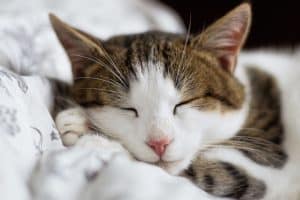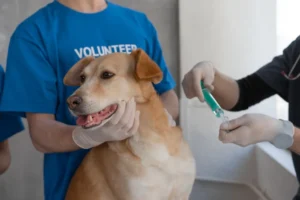Is your furry feline friend acting peculiar after receiving their vaccines? It can be concerning when your cat’s behavior takes an unexpected turn. Understanding why your cat may be acting weird after vaccinations is important for their health and well-being. Let’s explore the reasons behind this behavior and what you can do to help your kitty feel more comfortable.
After receiving vaccines, it’s not uncommon for cats to exhibit unusual behavior. This can include lethargy, decreased appetite, and even mild fever. These symptoms are typically mild and should subside within a day or two.
Reaction to Vaccines
Vaccinations play a crucial role in keeping our feline friends healthy and protected against various diseases. However, it’s essential to be aware of possible reactions your cat may experience after receiving vaccines. Common reactions can include lethargy, loss of appetite, mild fever, or soreness at the injection site. If your cat is acting weird after vaccinations, such as being more irritable, hiding, or showing signs of discomfort, it could be a reaction to the vaccines.
It’s important to monitor your cat closely for any unusual behavior following vaccinations. Most reactions are mild and resolve on their own within a day or two. However, if your cat’s symptoms persist or worsen, it’s best to consult your veterinarian. They can provide guidance on how to manage your cat’s symptoms and determine if further medical attention is needed. Remember, each cat is unique, and their reaction to vaccines can vary.
Stress and Anxiety
Visiting the vet and receiving vaccinations can be stressful events for cats. The unfamiliar environment, the presence of other animals, and the handling by veterinary staff can all contribute to your cat feeling anxious. This stress can manifest in various ways, including hiding, aggression, or excessive meowing.
To help reduce your cat’s stress levels during vet visits, consider bringing along familiar items such as a favorite blanket or toy. Additionally, using a comfortable carrier and providing positive reinforcement can help create a more pleasant experience for your cat. Some cats may benefit from calming aids like pheromone sprays or supplements to help alleviate anxiety.
Remember, preparing your cat for vet visits and acknowledging their stress can go a long way in improving their overall experience. By understanding and addressing your cat’s emotions, you can help them feel more comfortable and less anxious during vaccinations and vet visits.
Bonus Tip: If your cat continues to show signs of stress or anxiety after vaccinations, consider consulting with a feline behavior specialist. They can provide additional strategies and support to help your cat feel more at ease in veterinary settings.
Pain or Discomfort
If you notice your cat acting weird after vaccines, it could be due to pain or discomfort at the injection site. Just like when we get a shot, cats can experience soreness or tenderness after receiving vaccinations. This discomfort may cause them to be more lethargic, irritable, or even hide more than usual. Keep an eye on the injection site for any swelling, redness, or signs of pain. If you suspect your cat is in pain, you can gently massage the area or apply a warm compress to help alleviate any discomfort.
Allergic Reactions
Another reason your cat may be acting strangely after vaccines is the possibility of allergic reactions. While rare, some cats can have allergic responses to certain vaccine components. If your cat is experiencing symptoms like swelling, hives, difficulty breathing, or vomiting after vaccination, it could be an allergic reaction. In severe cases, allergic reactions can lead to anaphylaxis, a life-threatening condition. If you suspect your cat is having an allergic reaction, seek immediate veterinary care to address the issue.
Additional Insight: It’s essential to monitor your cat closely after vaccinations to watch for any signs of pain, discomfort, or allergic reactions. By being vigilant and proactive, you can ensure your cat’s health and well-being are prioritized.
Remember, always consult with your veterinarian if you have concerns about your cat’s behavior after vaccinations. They can provide guidance on how to address any issues and ensure your furry friend stays healthy and happy.
Behavioral Changes
Vaccines can sometimes cause behavioral changes in cats, such as lethargy, increased sleepiness, or decreased appetite. This is usually temporary and should resolve within a day or two. However, if your cat is acting unusually aggressive or anxious, it’s best to consult your veterinarian. To help your feline friend through this period, create a quiet and cozy space where they can relax undisturbed. Offer their favorite treats or toys to encourage them to eat and play. Remember, patience is key as your cat adjusts to the effects of the vaccination.
Monitoring Your Cat
After your cat receives vaccines, keep a close eye on their behavior for the next 24-48 hours. Some common signs to watch out for include mild fever, mild swelling at the injection site, or a decrease in activity levels. If you notice any concerning symptoms like persistent vomiting, severe lethargy, or difficulty breathing, seek immediate veterinary care. Additionally, monitor your cat’s water intake and litter box habits to ensure they are staying hydrated and eliminating properly. Remember, your vigilance and attention to detail can make a big difference in your cat’s recovery post-vaccination.
Monitoring Tips:
- Check Their Temperature: Monitor your cat’s body temperature post-vaccination to ensure they do not develop a fever.
- Observe Injection Site: Keep an eye on the injection site for any signs of swelling, redness, or discomfort.
- Watch for Lethargy: Notice any unusual lethargy or lack of energy in your feline friend.
- Fluid Intake: Ensure your cat is drinking water regularly to stay hydrated.
- Behavior Changes: Pay attention to any shifts in behavior patterns, such as increased agitation or withdrawal.
Remember, your cat’s well-being is a top priority, so don’t hesitate to reach out to your vet if you have any concerns about their post-vaccine behavior.
Home Comfort
If your cat is acting odd after getting vaccines, creating a cozy environment can help soothe their nerves. Make sure they have a quiet space to relax, with their favorite blankets or toys nearby. Providing a warm and comfortable spot for them to rest can make a world of difference in their recovery.
Interesting Fact: Cat Vaccinations
Did you know that cat vaccinations have helped significantly reduce the spread of infectious diseases among feline populations? By vaccinating your cat, you’re not only protecting their health but also contributing to the overall well-being of all cats in your community.
By understanding why your cat might be behaving strangely after their vaccines, you can take proactive steps to support their recovery. Remember, always keep an eye on your furry friend and consult your veterinarian if their behavior persists or worsens. Your cat’s well-being is worth the extra care and attention!
Alex, a passionate animal lover, has experience in training and understanding animal behavior. As a proud pet parent to two dogs and three cats, he founded AnimalReport.net to share insights from animal experts and expand his knowledge of the animal kingdom.




